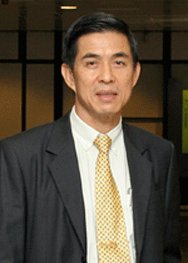HRH Leaders in Action Interview: Dr. Suwit Wibulpolprasert
An interview series with HRH champions in developing countries produced by the HRH Global Resource Center.

Dr. Suwit Wibulpolprasert chairs the Steering Committee of Asia Partnership on Avian Influenza Research and sits on the Steering Committee of Asia-Pacific Action Alliance on HRH. He is also the Chair of the Program Coordinating Board of the UNAIDS, and Chair of the Program and Policy Committee of the Global Health Workforce Alliance. He is the editor of a local journal for para-medical personnel and has produced radio and television programs on health and social issues for more than 15 years; as well as publishing more than 100 papers, reports and books locally and internationally. Dr. Suwit serves at the highest rank of Thailand's government officials as a Senior Advisor in Disease Control. He is also responsible for health policy and international health works of the Ministry of Health in Thailand.
What does it mean in Thailand to be an HRH leader?
It means that you have to coordinate other leaders and sectors to mobilize their leadership and their support, to improve the HRH condition in your country.
Can you briefly describe the path you took to your current position? How does that background support you as an HRH leader?
I worked thirty three years for my government as a supplier of health workers. I was an elected member of the medical house for thirty three years, including my time as the secretary general when I was responsible for the quality of doctors and other health workers. I was also a public health college director responsible for production of community health workers, and I worked for eleven years as a rural health services assistant. That is why I understand the importance of getting good quality, committed, motivated health workers distributed equally through the country.
What do you view as your most important lesson learned from your work, training health workers?
The most important issue is to train them on the real situations at work. Work-related training, on-the-job training, is the most important thing. [Health workers] also need a good role model in order to become committed health workers that aren't only interested in their own financial and nonfinancial benefit.
You've been heavily involved in high level policy work; can you explain how structural, political or economic factors affect HRH?
All these factors have an influence on HRH. For example, social recognition will motivate health workers to work in a committed manner because they are recognized. This can reduce the need for heavy financial incentives. It doesn’t mean that we do not have to give them enough money to survive; but social recognition plays an important role in ensuring their commitment.
What are the most rewarding aspects of your HRH leadership role?
When you see committed health workers help people, you feel happy. Thailand also has a bimonthly journal for community health workers. Every month we tell a story of committed health workers that can be role models for other people. Every time I read these stories, it's a reward for me.
What has been the biggest achievement for Thailand? And what do you think has made that possible in terms of HRH?
There are many good achievements. First, we have been able to distribute our health workers all over the country to good healthcare systems. In the mid 1980's our government decided, in spite of the economic crisis, to lay down strong health care infrastructure in rural areas all over the country, in health centers and district hospitals. This included producing huge numbers of community health workers to station in these facilities. The government froze the capital investment of urban hospitals for 5 years to mobilize the resource to build up these health facilities and needed health workers. These were the most important and essential political decisions that contributed to the success story of health systems and health workers in Thailand.
The second most important outstanding achievement is that we allow health workers to group together into civil society organizations. We have a rural doctors' society, a community health workers society, and a nursing society in Thailand. These workers also group together as civil society organizations to help and motivate each other and to work closely with us in improving their work conditions, morale and motivation.
What is the biggest HRH challenge you are facing right now? And how are you approaching that?
In spite of these successes, we still face problem of maldistribution. In Thailand we use all sorts of measures including compulsory public work in rural areas, rural recruitment, local training for home health placement, and strong financial incentives. For example, a new medical graduate right out of medical school working in the remotest rural area, will receive in one month more than a salary made by a high-level, experienced doctor in an urban area. We also have a program that rewards rural doctors with a promotion if they stay in a rural area up to 15 years, so they can be promoted to the same level in the government, as deputy director general, or deputy governor; while they are still working in the rural area.
But we still have serious shortage. Although we pay rural health workers well, private sectors have fought to pay them more. We also have 2 million foreign patients who come into Thailand every year who pay a lot to the private sectors, so the private sectors can afford to pay very high salaries for doctors.
What do you see on the road ahead for future HRH leaders in Thailand?
I have only one message, Work together! If we work together we can improve the situation.
Past HRH Leaders in Action Interviews
- 3685 reads




